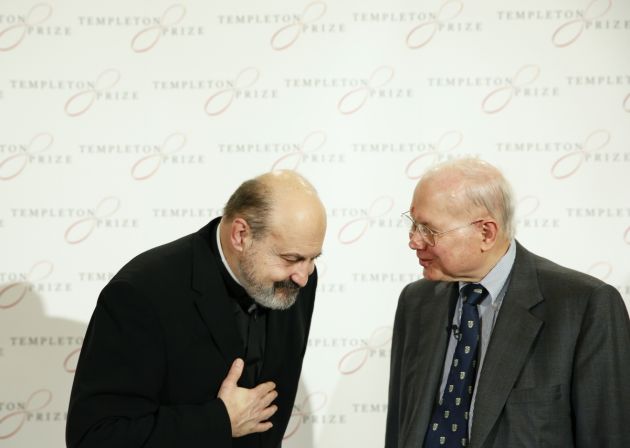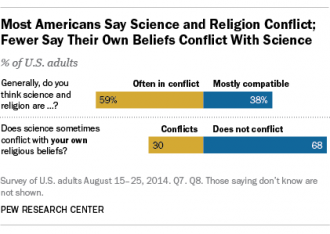Most in US say religion and science conflict, new report finds

When Pope Francis issued his June encyclical on climate change, some critics told him to stay out of the debate as religion and science don't mix.
A debate in turn ensued about the chemistry degree the Pope holds.
Now Pew Research has conducted a survey on: Are science and religion at odds with each other?
The report notes that from the heresy trial of Italian astronomer Galileo Galilei four centuries ago to the hubbub over Charles Darwin's theory of evolution, religion and science have often been seen as conflicting with each other.
The Pew report seeks to find if religious faith and the scientific business really are at odds with each other.
One of its key findings is that the least religiously observant Americans are most likely to perceive conflict between religion and science.
About 73 per cent of adults who seldom or never attend religious services say science and religion are often in conflict, while half of adults who attend religious services at least weekly say the same.
"People's religious differences do not play a central role in explaining their beliefs on a number of science-related topics – ranging from views about climate change to the safety of genetically modified foods," says Cary Funk, an associate director for research at Pew Research Center and one of the report's authors.
The report finds a majority of the U.S. public says science and religion often conflict, with nearly six-in-ten adults (59 per cent) expressing this view in newly released findings from a Pew Research Center survey.
THOSE SEEING SCIENCE AND RELIGION IN CONFLICT INCREASE
The share of the public saying science and religion are often in conflict is up a little from 55 per cent in 2009, when Pew Research conducted a similar survey on religion and science.
People's sense that there generally is a conflict between religion and science seems to have less to do with their own religious beliefs than it does with their perceptions of other people's beliefs.
Fewer than one-third of Americans polled in the Pew survey (30 per cent) say their personal religious beliefs conflict with science, while more than two-thirds (68 per cent) say there is no conflict between their own beliefs and science.
The least religiously observant are most likely to say science and religion are often in conflict.
Furthermore, the idea that science and religion are often in conflict is particularly common among Americans who are, themselves, not very religiously observant (as measured by frequency of attendance at worship services).
About 73 per cent of adults who seldom or never attend religious services say science and religion are often in conflict.
Against this, among more religiously observant Americans – those who report that they attend religious services on a weekly basis – half (5 per cent) share the view that science and religion frequently conflict.
Of the major U.S. religious groups, Hispanic Catholics and white evangelical Protestants are especially likely to say science and religion are mostly compatible.

At the same time about half of both groups take this position.
But white evangelical Protestants also are somewhat more likely than members of other large religious groups to see a conflict between science and their own religious beliefs; 40 per cent of white evangelicals say their personal beliefs sometimes conflict with science, while 57 per cent say they do not.
The public is closely divided on whether churches and other houses of worship should state their views about policy decisions on scientific issues; half of adults say churches should express their views on these issues, while 46 per cent say these organizations should stay out of policy decisions on scientific issues.
Most white Evangelicals and black Protestants say churches should express views on scientific policy Issues
White evangelicals (69 per cent) and black Protestants (66 per cent) are more likely than other religious groups to think churches and other places of worship should express their views about scientific policy issues.
For Catholics opinions on this are divided with 45 per cent saying churches should express their views and 49 per cent saying they should keep out.
At the same time some two-thirds (66 per cent) of religiously unaffiliated adults say churches should keep out of policy decisions on scientific issues, 31 per cent say otherwise.
